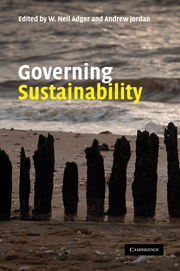Book contents
- Frontmatter
- Contents
- List of figures
- List of tables
- List of contributors
- List of abbreviations
- Foreword by Jonathon Porritt CBE
- Preface
- Part I Overview and Context
- 1 Sustainability: exploring the processes and outcomes of governance
- 2 Human development and environmental governance: a reality check
- Part II Governance and Government
- Part III Governance and Civil Society
- Part IV Governance and Decision Making
- Part V Conclusions
- Index
- References
2 - Human development and environmental governance: a reality check
Published online by Cambridge University Press: 05 June 2012
- Frontmatter
- Contents
- List of figures
- List of tables
- List of contributors
- List of abbreviations
- Foreword by Jonathon Porritt CBE
- Preface
- Part I Overview and Context
- 1 Sustainability: exploring the processes and outcomes of governance
- 2 Human development and environmental governance: a reality check
- Part II Governance and Government
- Part III Governance and Civil Society
- Part IV Governance and Decision Making
- Part V Conclusions
- Index
- References
Summary
Introduction
In the post-Johannesburg, post-Rio and post-development era, it appears that the global problems of both widespread poverty and environmental degradation just get worse, not better (see Steffen et al., 2004). The impacts of the global political economy of oil and the entrenchment of underdevelopment in Africa and parts of Asia are endangering planetary resilience and making many people's livelihoods and wellbeing more precarious. In some respects, the world has moved further away from sustainable development, not towards it.
Since Brundtland's 1987 vision of interdependence gained currency (WCED, 1987; see also Chapter 1), the synergy between the goals of international development and environmental conservation have often been taken for granted. To date, however, systems of national and international governance have found this synergy very difficult to achieve. Many attempts have been made by governments and global systems of governance to integrate the objectives of international development and environmental sustainability. These have been undertaken through bilateral and multilateral environmental agreements, at one scale, through to the promotion of decentralised integrated conservation and development projects at more local scales. This integration element of environmental governance is often held up as one of the panaceas for sustainable governance.
This chapter presents an analysis of the experience and types of integration, and outlines a set of fundamental challenges which remain if real progress is to be made.
- Type
- Chapter
- Information
- Governing Sustainability , pp. 32 - 52Publisher: Cambridge University PressPrint publication year: 2009
References
- 18
- Cited by

